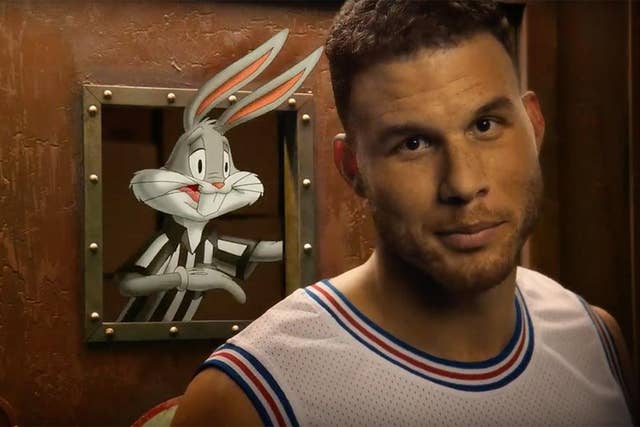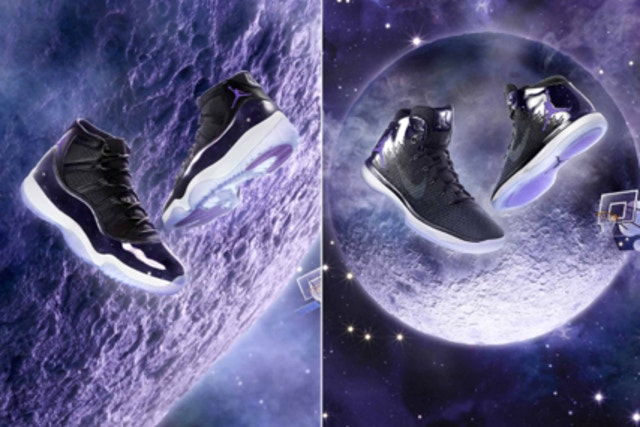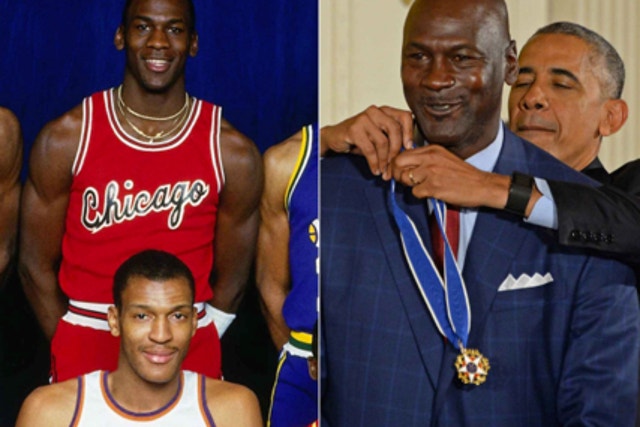
Inside Jordan Brand's big bet on Space Jam

LOS ANGELES — When Jordan Brand releases the Space Jam 11 on December 10, the demand for the highly-coveted sneakers will stall websites and cause thousands of customers to queue up anxiously at their local malls. The iconic black/dark concord/white colorway, which first debuted in 1995 and was most recently re-released in 2009, will sell out in just a few hours despite a $220 price tag. If you started watching the movie Space Jam when the Space Jam 11s first hit Nike.com early that Saturday morning, the shoes would only be available from eBay or other secondary sellers, with a painful mark up of hundreds of dollars, by the time the final credits rolled.
In an ever-evolving sneaker marketplace that has seen adidas and Under Armour mount new challenges to the longstanding Nike/Jordan stranglehold, the distinctive patent-leather Jordan 11 endures as a gold standard, an annual anchor release guaranteed to generate significant buzz and profits. The Space Jam 11, in turn, is a gold-plated, timeless retro design that taps into both Jordan’s legendary basketball career and his classic big screen partnership with Bugs Bunny and his Looney Tunes crew.
For Jordan Brand, the 20th anniversary of Space Jam’s 1996 release and the guaranteed popularity and visibility of the Space Jam 11 created a massive opportunity. The company’s response? An integrated global marketing campaign that sought to leverage the Space Jammystique in pursuit of at least four key goals: reaching younger consumers; tapping the original film for retro sneakers and apparel designs; cross-promoting its latest flagship sneaker, the Jordan 31; and giving a high-profile stage to two key endorsers, Blake Griffin and Jimmy Butler.
The following is an inside look at Jordan Brand’s big bet on Space Jam, complete with one-on-one interviews of Griffin and Butler, big-picture thoughts from the campaign’s key creative architects, and behind-the-scenes looks from Griffin’s commercial shoot in downtown L.A. and an exclusive November screening of Space Jam at Warner Bros. Studios in Burbank, Calif.
The Monstars Return
The centerpiece of the Space Jam campaign is this 90-second ad, which will premiere Thursday on TNT’s NBA double-header and NBC’s NFL broadcast.
In the spot, the evil “Monstars” from Space Jam seek vengeance for their loss to Jordan and the Toon Squad by returning to threaten life, liberty and the future of basketball. “The original Superteam is back,” a narrator intones, as shots of a dark world, one-sided scoreboards and propaganda billboards cycle on screen. “Forget the Death Lineup. This is the Apocalypse Lineup.” Griffin and Butler are cast as the leaders of a resistance against a foe even more unconquerable than the Warriors.
Angus Wall, the ad’s director, described Butler as a “mythical” narrator who bookends the story. Griffin filled a modified version of Jordan’s movie role, donning a red, white and blue “Tune Squad” jersey to take on the Monstars.
“There’s a delicate balance between the playfulness of Warner Bros. and the edginess of Jordan Brand,” said Wall, who has won Academy Awards for editing The Social Network and The Girl with the Dragon Tattoo. “We tried to combine those elements in the spot from the beginning. I’m attracted to anything that has a dystopian feel to it. I think a lot of people are. It taps into a rebellious spirit.”
While Butler casts a more ominous figure, Griffin functions as a more traditional Warner Bros. superhero, even dropping a “Who’d you expect? Elmer Fudd?” callback as he banters with Bugs Bunny. The Clippers’ forward filmed his scenes in a dark, nondescript, almost dingy L.A. warehouse, where he busted down a door and led the teenagers towards their showdown with the Monstars.
Wall has worked on Nike and Jordan ads dating back to 1990’s “Mr. Robinson’s Neighborhood,” and he encouraged Griffin, who moonlights as an aspiring stand-up comedian, to adlib different versions of his lines. “I had to stop laughing in between takes because I didn’t want to pollute his audio,” Wall said. “He brought it completely.” Somehow, Griffin’s best line—a perfectly incredulous “Who’d you expect? Drake?” that made the whole set laugh—didn’t make the final cut.
The Space Jam 11s are noticeably downplayed in the ad, appearing only briefly in a glass case about halfway through. Instead, the ad pushes Space Jam versions of the 31, Butler’s shoe, and a Space Jam apparel line that includes t-shirts and sweat suits. The Super.Fly 5, Griffin’s shoe, and the Jordan Trainer 1 also appear in Space Jam colorways in the spot.
“Any time we have a story, style and soul of an [original] OG shoe that can be applied to a future shoe like the 31 in color and material, it gives the consumer something to be emotionally attached to,” said Jordan VP of Design David Creech. “We’re trying to weave the story so that this isn’t just about an OG launch. We want to tie the 11 and the 31 together to forge the future and inspire the next generation.”
Jordan Brand took a similar cross-marketing approach back in July when it released the first version of the 31 in black/red alongside a retro version of the popular Jordan 1 with the same colors. This synchronized release allows Jordan Brand to target multiple consumer groups rather than simply feed its ravenous retro audience.
Hardcore collectors might purchase both the 11 and the 31 to complete a set. Customers that strike out while trying to purchase the 11 now have a fallback option in the 31. Parents who might balk at the 11’s price tag now have multiple, less expensive alternatives. And teenagers, who weren’t born yet in 1996 and might not be consumed by the retro phenomenon like their older siblings or parents, have access to Jordan’s latest models in a popular colorway while also receiving an extra dose of exposure to the company’s history.
Crafting The Message
That last group, younger consumers, has been subjected to a never-ending onslaught of pitches from sneaker companies for as long as anyone can remember. The cycle continues in 2016. Stephen Curry’s latest Under Armour ad prominently features children and teenagers who are looking past “old news” and on to what’s next. In a recent adidas spot, James Harden pushes back on “boring” conventional criticisms of his game alongside interspliced clips of high schoolers celebrating and freestyle rapping. Nike’s newest LeBron James ad opens with children playing pick-up hoops and closes on a high school version of James.
Retaining a cutting-edge image in the minds of young consumers is a unique challenge for a brand whose name, identity, logo and reputation are tied to a 53-year-old Hall of Famer who retired in 2003. When Jordan first rose to prominence, he embodied basketball counterculture with his gaudy gold chain and shoes so futuristic that they drew fines from the NBA. Now? Jordan is an establishment figure who was recently presented with the Presidential Medal of Honor by Barack Obama, who joked about Jordan’s ubiquitous presence in social media memes. Jordan Brand executives like Creech understand this generational divide personally; his two teenaged daughters both play basketball, but they have only seen Jordan play in YouTube clips and when their father introduced them to Space Jam.
The trick for Jordan Brand’s marketers, then, is to ensure the company’s products have enough mass appeal and nostalgia to continue dominating the marketplace without exposing the company to charges of old guard conventionalism.
The first chapter of this year’s approach was blunt: Russell Westbrook served as the front man for the Jordan 31, which leaned heavily on the word “Defy” in its product messaging to tie Westbrook’s outside-the-box fashion sense to a young Jordan. A few months later, Westbrook and a handful of kids took turns dancing to his unofficial theme song, “Now I Do What I Want,” in a Jordan Brand spot. And when Westbrook was inducted into the Oklahoma Hall of Fame earlier this month, Jordan was there to present him, taking care to note that he “sees a lot of resemblance” between Westbrook’s passion and his own.
This Space Jam campaign redeploys the “Defy” messaging as a rallying cry against the Monstars and uses Butler and Griffin as Westbrook-like links to young consumers. “The ad has lots of Monstars propaganda trying to get people to comply with a soulless version of the game,” Jordan Brand VP & GM of Global Categories Whitney Chapman explained at the Burbank screening. The spot’s young actors receive shoes and gear from Bugs Bunny to help them push back against the heavy-handed Monstars. And in the final scene, Butler spray paints the word “Defy” on a wall in a dark alley, an image made more provocative by its release shortly after an intensely polarizing presidential campaign and a series of nationwide protests.
Ultimately, the story arc and the comply/defy dichotomy combine to link Griffin, Butler and the Jordan experience with a desire for creativity, empowerment and freedom of expression, both on and off the court. Careful viewers will recognize the messaging as an elaborate twist on the same themes that are driving ads across the industry, from Nike to Under Armour to adidas.
“Defy means different things to different people,” Griffin said, after his filming wrapped in Los Angeles. “Defy to MJ meant coming back after his unsuccessful tryout in high school or going back over and over until he beat the Pistons. To me, defy means defying the odds, defying what people are saying, defying the naysayers to reach your goals. We were one of 29 teams that didn’t win a championship last year, but I don’t let that discourage me.”
Picking The Pitchmen
When it came time to decide who should front the Space Jam campaign, Griffin and Butler made for a natural pairing. Both are established All-Stars. Both are in their primes. And both play in big markets. Jordan Brand tested the waters with a shorter Space-Jam themed adstarring Griffin last year, and it was looking for the right stage to present Butler, a fairly recent signee, to a national television audience.
For Jordan Brand, playing style and personality are key considerations when it comes to selecting endorsers. Like Westbrook, both Griffin and Butler reinforce the “Defy” concept by breaking out of clear positional designations and by playing with relentless activity. Griffin is a playmaking, high-flying power forward who is unafraid to start a fast break. Butler can credibly defend four spots, while serving as a point guard-like initiator and a scoring-minded off guard on offense.
“Russell and Jimmy have a tenacity and all-world athleticism,” Griffin said. “They assume a lot of responsibilities for their teams. They’re complete players with no major weaknesses.”
During a recent Clippers victory over the Bulls at Staples Center, Griffin and Butler went chest-to-chest on the decisive play, with the 6’10” Griffin working to find a perimeter jumper and the 6’7” Butler refusing to give an inch before getting whistled for a disputed foul.
“When I first met MJ [after joining Jordan Brand], his message to me was to never settle,” Butler said, while on set in Chicago. “I told MJ, ‘That’s one thing you don’t have to tell me.’ … [Griffin and Westbrook] do everything really well: scoring the ball, defending, shooting, passing, rebounding. If you go up against them, you know it’s going to be tough to guard them, get by them or get a rebound over them.”
A big man who handles like a guard. A wing who isn’t afraid to bang on the block. Both fit the bill as messengers for an inspirational, individualistic spot, and it helped that both have personal attachments to the movie. Griffin’s 8th birthday party in Oklahoma was Space Jam-themed, while Butler, who endured serious hardship while growing up in Texas, remembers being caught up in the film’s scope.
“From that first scene, when young MJ is shooting in the backyard and he jumps up and the shot cuts over,” Butler remembered. “I wanted to do that. I mimicked it a thousand times whenever I saw a hoop. That movie was just big. You can reach your dreams if you dream big enough.”
Attention To Details
Theoretically, the biggest risks when a company pursues a strategy like Jordan Brand’s all-out Space Jam holiday campaign are dilution and oversaturation. Flooding consumers with similarly marketed products can often have the unintended consequence of diminishing interest in the original product. If different versions of Space Jam sneakers are widely available, will the Space Jam 11 lose some of its prestige and appeal now or in the future?
That question hangs over Jordan Brand’s entire approach to retro shoes too. Will customers eventually lose interest in the Jordan 11 or the 1 or the 3—the most popular models—if they are released in multiple colorways year after year and, sometimes, month after month? How deep, exactly, is the consumer’s well of nostalgia when it comes to high-end sneakers?
Jordan Brand’s “Space Jam” campaign seems to address these fears head on by paying attention to minor details that its core fans will appreciate.
On the Space Jam 11, the patent leather is cut to the exact same specifications as the model worn by Jordan in the movie, giving it a higher profile than some other 11 models. The number “45” is also stitched on the back of both shoes, a reference to Jordan’s jersey number when he debuted the shoes during the 1995 playoffs against the Magic. “I’ll probably wear them a couple times this season,” Butler said. “Look for my calf muscle looking really big and athletic.”
Jordan Brand is also releasing a retro version of the Jordan 9 on Dec. 3. Although Jordan never wore the shoes on the court, the Jordan 9 does make a brief cameo during the trophy room scene in Space Jam. The sneaker features Japanese words that translate to “World” and “Sport,” a reference to Jordan’s expanding global popularity at the time of its original release in 1993, during Jordan’s first retirement. “The 9 is a bookmark for that time in the history of sneakers,” Creech said.
The Space Jam 31 not only uses the same colorway as the 11, from the light blue sole on up, but they also incorporate the trademark black patent leather on the upper. A number of classic Nike and Jordan marks—the Jumpman logo, two disguised swooshes and the “Air Jordan” flight crest—dot the sneaker. Like the 11, the shoe is designed to be worn both on and off the court. “I like how the pattern fades from light to dark, and the patent leather of course,” Butler said. “There’s so much you can do with these.” The 31 will release on December 3.
To build buzz, Jordan Brand designed and distributed collector’s edition boxes to select media members. The outside of the box, which houses the 11 and the 31, is papered with the same “Comply” propaganda featured in the 90-second ad. Inside, Jordan included a Monstars graphic, a video message announcing the Monstars’ return, a blacked-out Toon Squad jersey, a Blu-Ray copy of the film, and a water bottle marked with “Monstars’ secret stuff,” another movie reference.
At the Burbank screening, Jordan produced a mock-up newspaper—“The Daily Jordan”—which hailed the Monstars’ return and included additional artwork and special movie tickets featuring the Jumpman logo.
In addition to some of the movie callbacks discussed earlier, the 90-second ad has a few Easter eggs for diehards. For example, the Monstars appear in an “Uh oh” poster that mimics Nike advertising from the 1990s featuring Terry Porter, Jerome Kersey and Buck Williams of the Blazers.
To the uninitiated, these steps might feel like overkill. Jordan Brand, though, seems to relish in these details as a method for keeping its most demanding customers satisfied.
“For someone to be as celebrated [as Jordan] for that many years speaks to how well the movie was done and everything that’s happened since to keep the movement going,” Griffin said. “The level of excitement that people still have when you mention Space Jam is pretty awesome.”
Sticking The Landing
At the Burbank screening, Warner Bros. executives repeatedly called Space Jam a “cult classic,” due to the enduring excitement among the film’s ardent fan base. While executives at both Warner Bros. and Jordan Brand remain mum on the possibility of a long-rumored sequel, there’s little doubt Space Jam sneakers will sweep through both the NBA and sneakerhead communities over the next month.
Butler plans to wear the Space Jam 11 and 31 on the court, Griffin will wear the Space Jam Super.Fly 5 in games and mix in other retros off the court, LaMarcus Aldridge showed off his Space Jam collector’s box last week, and other players will surely give the sneakers additional television exposure.
Meanwhile, Creech lists the Space Jam 11 alongside the Jordan 1 as his favorite sneaker of all time, noting that the “combination of the film, sneaker culture and the colorway has stood the test of time.” Proving that point, SoleCollector.com, a leading sneaker news websites, has been tracking Space Jam 11 updates drip by drip for the better part of 2016.
Jordan Brand’s hope, of course, is that the response to the 20th anniversary celebration from players and sneaker enthusiasts will help hook young millennials and teens into the Space Jam universe.
“Space Jam is one of our favorite stories to tell,” Chapman said. “This movie broke a ton of barriers with a simple idea: putting together basketball, pop culture and sneakers in a way that hadn’t been done before. Whether you liked basketball or not, it opened up this aperture for kids to look at things in a different way.”
Now, Jordan Brand waits to see if its meticulous and calculated bet will pay off again, two decades after the original.
This article originally appeared on Sports Illustrated.














